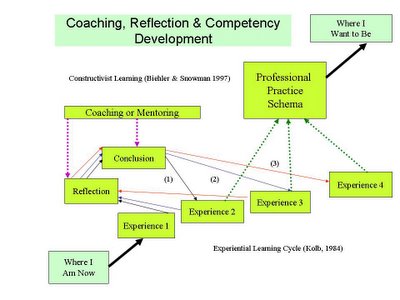Blogging and Fieldwork Education
 The professional development experience can be heightened by using Blogs and peer coaching, particularly during fieldwork education. Your community of practice, blog group or on line community (whatever you want to call them) can support you in managing some of the difficult challenges you will face as a novice practitioner. If you want to know more about how peer coaching aligns with the professional development experience here is a publication you can order online from the Higher Education Research and Development Society of Australasia. Its entitled, "Reciprocal Peer Coaching: A Strategy for Training and Development in Professional Disciplines"
The professional development experience can be heightened by using Blogs and peer coaching, particularly during fieldwork education. Your community of practice, blog group or on line community (whatever you want to call them) can support you in managing some of the difficult challenges you will face as a novice practitioner. If you want to know more about how peer coaching aligns with the professional development experience here is a publication you can order online from the Higher Education Research and Development Society of Australasia. Its entitled, "Reciprocal Peer Coaching: A Strategy for Training and Development in Professional Disciplines"http://www.herdsa.org.au/guidescription.php
When entering a Blog with the hopes of getting some support from your Blog Group you should select events that are metacognitively rich experiences. These types of experiences are typically novel, complex, challenging and ill-defined. A single solution the problem may be elusive. Learners find these experiences challenging and often difficult to manage independently. Gaps in knowledge, feelings of anxiety and uncertainty frequently dominate thinking in these types of experiences. Approaching a supervisor for help can sometimes be daunting because of fears of negative appraisal. A community of practice or trusting blog group, on the other hand, can be of great use when trying to work through these difficult practice challenges. What exactly is a community of practice?
Here is a link to an example Community of Practice within a Health Care Context.
http://www.hscn.on.ca/templates/cpd_template.asp?section_id=70&page_id=601
The site provides a brief definition and also provides some examples of communities of practice that share a particular topic of interest. Imagine how the group could expand its learning if it set up a BLOG group!
The use of blogging, therefore, as part of a learning strategy can be a very powerful way of improving your professional performance. feedback. The collective discussion about the challenge heightens everyone's learning because people have to articulate what they know, and admit what they don't know. Knowledge gaps become the motivation for further exploration and quite often, things that individual's didn't even know they didn't even know become uncovered, and available for action. This type of learning is driven by what is called cognitive development theory. The sharing of knowledge between individuals within a blog group exposes knowledge gaps, contradictions and assumptions. The realisation of this is disrupts equilibrium, and the group will attempt to restore equilibrium by trying to find solutions to the problem. This disruption of equilibrium is termed cognitive conflict and the actions of the group in trying to answer their questions restores equilibrium. This is the essence behind cognitive development theory. A blog group or community of practice, therefore, is a social learning group. Hence, blogging within a group that you grow and trust and respect is a great way to get answers to questions and to learn more about your professional practice.
Just about any learning challenge can be entered into a BLOG with the hopes that your community of practice will support you in looking at ways of managing the situation.? here are some examples:
- Difficult cases (health care, law , business) - support with the reasoning process
- Ethical dilemmas - brainstorming options
- Managing interpersonal conflict - brainstorming options
- Emotional support - words of encouragement
- Requests for information and resources to support reasoning


